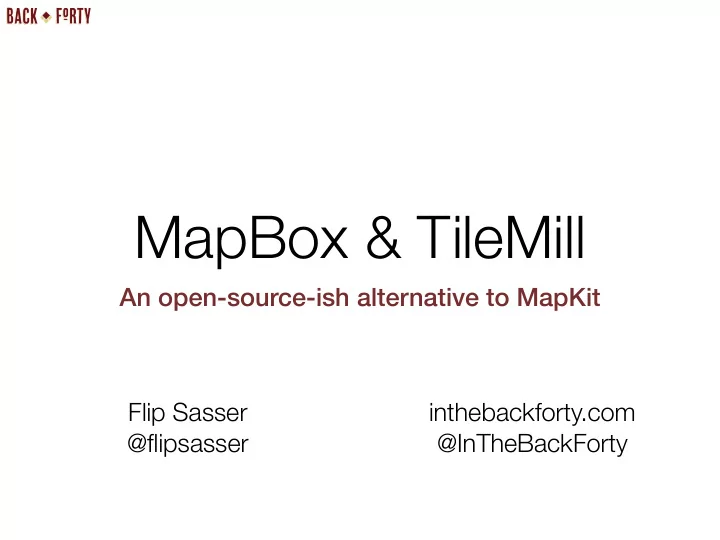

MapBox & TileMill An open-source-ish alternative to MapKit Flip Sasser inthebackforty.com @flipsasser @InTheBackForty
I’m Flip I’m just learning about MapBox but it’s kinda cool but kinda not so let me explain
The Fit TileMill iOS MapBox (makes tiles) (makes maps) (renders maps)
Chapter 1 MapBox serves your tiles (if you ever get them)
Creates a tile API endpoint for your map < iframe width='500' height='300' frameBorder='0' src='http://a.tiles.mapbox.com/v3/flipsasser.map- tlt4zah7.html#14/39.274300000000004/-76.602'> </iframe>
This is a *pay* service But if you can get TileMill to export, you get a free, locally cached tileset!
Chapter 2 TileMill in all its misery glory misery
Node.js-backed HTML UI It’s “cross platform”
Draws tile layers from various data sources What data sources? • Open Street Maps • Open ... Street Maps • Open, well, Street Maps
Ways to get OSM data Because there’s a lot of it
The firehose planet.openstreetmap.org/ 25GB of data
Landmasses (landmassï?) download.geofabrik.de/openstreetmap/ Large maps or maps of specific territories
Coastlines openstreetmapdata.com/data/land-polygons These make a *huge* difference
Coastlines w/OSM base data
*that’s Baltimore, yo! Coastlines w/detailed data*
Streets, railways, and buildings metro.teczno.com/ Look for your specific metro area
Path layers Style as lines Point layers Style as markers Polygon layers Style as shapes Put ‘em together
CartoCSS for to style your maps with It’s LESS CSS, but insane
1 @font : "Futura Medium"; 2 @font_alt : "Futura Medium Italic"; } 3 @water : #94a0c8 ; Variables & functions like LESS 4 @land : #f4efd2 ; 5 @park : #c5dead ; 6 @road : lighten( @land , 50%); 7 @tunnel : lighten( @water , 10%); 8 @non-road : lighten( #000 , 50%); 9 @industrial : lighten( #000 , 50%); 10 @bridge : lighten( @industrial , 30%); 11 @runway : lighten( @non-road , 30%); 12 @building : darken( @land , 20%); 13 @outline : darken( @land , 65%); 14 @outline-opacity : 0.1; 15 16 Map { 17 background-color: @water ; 18 } 19 20 #land { 21 polygon-fill: @land ; 22 polygon-opacity:1; 23 } 24 25 #water { 26 polygon-fill: @water ; 27 } 28 29 #buildings { 30 building-fill: @building ; 31 building-fill-opacity:0; 32 building-height:10; 33 34 [zoom>=15] { ...but that ain’t LESS 35 building-fill-opacity:0.9; 36 } 37 } 38
Still, you can make pretty maps...
That’s not a time! That a thing takes! Unless they’re too complex.
That’s not an amount of CPU! That a thing takes! Unless they’re too complex.
My map of Baltimore wouldn’t export. It’s *just* of Baltimore.
Chapter 3: iOS Cause you’re all like, “WTF THIS IS BMORE COCOA NOT BMORE MAPPING”
3.1: Installing MapBox I prefer git submodules. YMMV, but this is how I got it working. $ git submodule add git://github.com/mapbox/mapbox-ios-sdk.git
Add MapBox’s submodules $ git submodule update --init --recursive This is the *most important* part of getting MapBox running!
Add MapBox to your target Demo/mapbox-ios-sdk/MapView/MapView.xcodeproj drag to your Frameworks folder
Add libraries to your target • CoreLocation • QuartzCore • libsqlite3 • libz • libMapBox
Add to your header search path $(SRCROOT)/mapbox-ios-sdk/MapView/ Add to Header Search Paths for your target Check “recursive”
Target dependencies & resources
...back to the demo MapBox ID 1 - (void)viewDidLoad { 2 RMMapBoxSource *onlineSource = [[RMMapBoxSource alloc] initWithMapID:@"flipsasser.map-tlt4zah7"]; 3 self .mapView = [[RMMapView alloc] initWithFrame: self .view.frame andTilesource:onlineSource]; 4 self .mapView.autoresizingMask = UIViewAutoresizingFlexibleHeight | UIViewAutoresizingFlexibleWidth; 5 self .mapView.hideAttribution = true ; 6 self .mapView.showLogoBug = false ; 7 self .mapView.tileSource = onlineSource; 8 [ self .view addSubview: self .mapView]; 9 [ super viewDidLoad]; 10 }
Voilà!
RMMBTilesSource For storing tiles locally
Local Source 1 - (void)viewDidLoad { 2 NSURL *tileSetURL = [[NSBundle mainBundle] URLForResource:@"Baltimore" withExtension:@".mbtiles"]; 3 RMMBTilesSource *localSource = [[RMMBTilesSource alloc] initWithTileSetURL:tileSetURL]; 4 self .mapView = [[RMMapView alloc] initWithFrame: self .view.frame andTilesource:onlineSource]; 5 self .mapView.tileSource = localSource; 6 [ self .view addSubview: self .mapView]; 7 [ super viewDidLoad]; 8 }
Voilàier!* *this is a tiny subset of my original map
RMMapViewDelegate For adding markers, shapes, layers! For responding to boundary changes! For handling taps and gestures! RTFM!
Other awesome stuff • REAL shape drawing • Custom tile systems (for the adventurous!) • Caching of remote tiles • Animated zooming (looks AWESOME)
Drawbacks
TileMill The worst or the worst?
Raster vs. Vector Tiles are old technology
Pay-to-play You pay for the API, or you pay to remove the logo from the UI, or you pay for both
Conclusions
MapBox is right if you need... • Custom map styles • Complicated drawing • Beautiful animation • Public APIs for drawing, tiling, and mercator projections • Accurate data (thanks anyway, Apple)
MapBox is wrong if you need... • Simple or quick maps • Vector maps • Money
Thnaks! github.com/BackForty/map_box_demo
Check out demo the source and this presentation: github.com/BackForty/map_box_demo
Recommend
More recommend